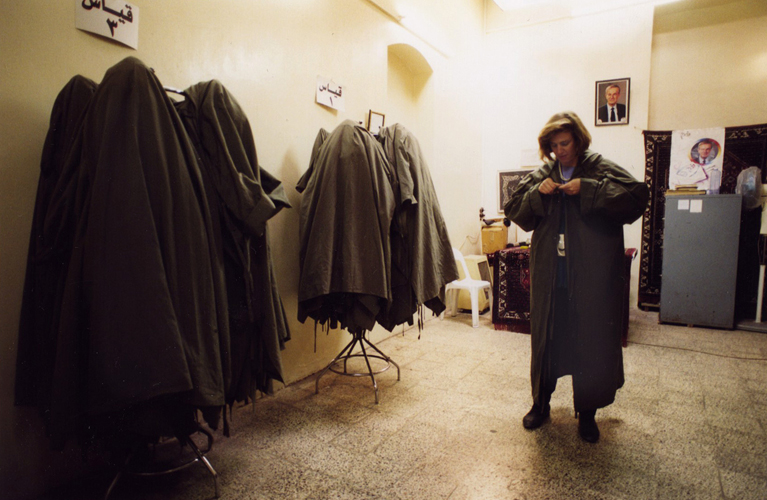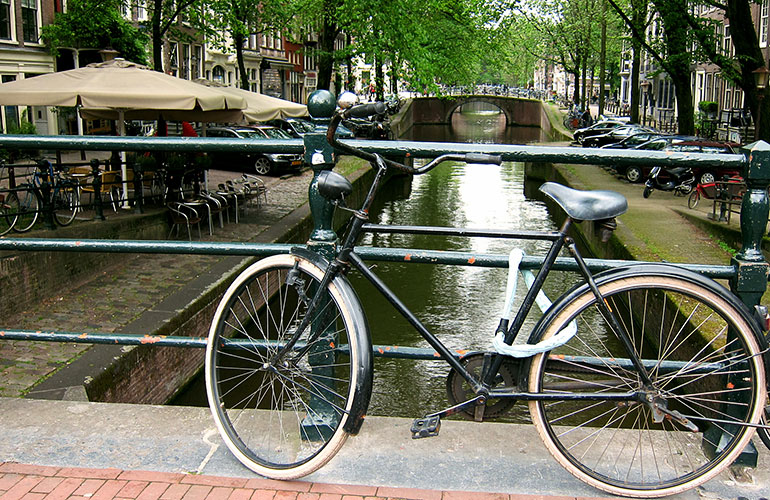Fascinating Rules of Etiquette From Around the World
 In Syria etiquette means dressing properly for mosques. That’s me covering up in the “Putting On Special Clothes Room” of the Umayyad Mosque in Damascus several years ago.
In Syria etiquette means dressing properly for mosques. That’s me covering up in the “Putting On Special Clothes Room” of the Umayyad Mosque in Damascus several years ago. Always cover up in mosques in the Middle East. Never pick up food with your left hand in Africa. Don’t snap photos of locals without asking permission. This is some of the travel etiquette you may already know. But there are plenty of unusual customs around the world that you probably aren’t aware of. Here are a few fascinating rules for how not to be an ugly American, crowd-sourced from some of the most well-traveled people I know: my Facebook friends. Enjoy the whirlwind trip around the globe!
“In Bulgaria, shaking the head YES (up and down) means no, and shaking the head NO (sideways) means yes. Makes for some confusing question-and-answer sessions!”
—Kristen Gill

Istanbul, Turkey. Photo courtesy Crystal Cruises.
“In Turkey, shaking your head means, ‘I don’t understand. Say it again.’ To say ‘No,’ click your tongue and toss back your head. This is useful to know when you want to say ‘No’ to the avalanche of vendors who assault you in Istanbul. Shaking your head will only make it worse.”
—Inka Piegsa-quischotte
“In South Africa, ‘just now’ means sometime in the near future—not immediately! (‘Now now’ means immediately.)”
—Sunit Sanghrajka
“When the French say, ‘Thank you,’ it often means ‘No, thank you.’ You are expected to insist.”
—Benoit Gateau-Cumin
“In the United Kingdom, ‘What a delightful idea!’ means ‘No, not in a million years.’”
—Ileana von Hirsch
“If you like your friends, spit on them! The Masai tribe of East Africa greet each other by spitting on each other. When greeting an elder, they spit on the shaking hand before offering it.”
—Sunit Sanghrajka
“In the Arctic, with the Inuit people, always remove your gloves/mitts to shake hands.”
—Thomas Lennartz
“In South Korea (and I’m sure in other Asian countries), it is very rude to keep your hands in your pockets when speaking with someone, particularly in business transactions. Bill Gates was vilified recently for doing this.”
—Lisa Gill
“In France, when dining, keep your hands not in your lap but on the table. It’s the opposite of the USA, where you keep your hands off the table and in your lap.”
—Howard Lewis
“In France, when entertaining at home, you offer seconds of each course. Except the cheese course. Offering/accepting seconds of cheese is a major faux pas.”
—Benoit Gateau-Cumin
When greeting a Parisian friend, a kiss on each cheek is customary. In Geneva, three kisses. In Brussels, four! The kissing order is L-R (Paris), L-R-L (Geneva), L-R-L-R (Brussels and the boonies). So you know…
—Bob Preston

Montalcino, Italy. Photo by Brian Dore.
“In Italy cappuccino is a morning drink. It is gauche to drink it in the afternoon or evening: Switch to espresso.”
—Angela Nickerson
“At pubs in Ireland, if you sit at a table, people will leave you alone and give you space. If you sit at the bar, you will have conversation and craic (pronounced crack)—meaning, a good time.”
—Jonathan Epstein
“Never pour yourself a drink in Japan. Serve the others and wait until they serve you.”
—Debbie Pappyn
“Don’t tip or blow your nose in public in Japan.”
—Gary Leff
“Gift giving is very important in Japan. Be sure to take gifts with you. You never know when you might need one.”
—Angela Nickerson
“In Thailand, Laos, Cambodia, and Burma, do not touch adults on the head and do not use your feet to point at objects.”
—Sandy Ferguson
“In Asia when exchanging business cards, always exchange with both hands, study it for a moment, then nod. Of course, your cards should be in the language plus English.”
—Vivian Deuschl
“Russia is the land of superstitions! No knives, scarves or clocks as presents. No shaking hands through a doorway. Never acknowledge a pregnancy (really – no showers, no nothing). No whistling in someone’s home. Always give an odd number of flowers.”
—Gwen Kozlowski

Not all flowers make good gifts—check local customs. Photo: Billie Cohen
“When gifting flowers, check to be sure what flowers are no-no’s in various cultures around the world. Some flower types are not well received, as they represent death, and color matters.”
—Katey Hartwell
In India, always use only your right hand for eating, receiving, and giving things. The left hand is to be used for only personal things such as wiping after going to the bathroom and handling items that have touched the ground, such as your shoes.
—Sunit Sanghrajka
“When flagging down a taxi in Peru, extend your arm out level and wave downwards towards your body. Putting your open palm up like as a stop signal is considered very rude, and raising your arm skyward just looks fanatical.”
—Clark Kotula
“If you are visiting a Himba village in Kaokoland, Namibia, never cross the imaginary line between the holy fire and the headman’s hut. This is a major insult and will make the visit more than a little unpleasant.”
—Chris Liebenberg
“It’s not a custom, exactly, but it’s a pet peeve of mine: Don’t expect everyone you see in a country to speak English!”
—Benét WIlson
Be a smarter traveler: Follow Wendy Perrin on Facebook and Twitter @wendyperrin, and sign up for her weekly newsletter to stay in the know.














In Greece, never wave to someone palm out with all fingers extended — it’s an insult to “give someone five” (means cufrsing them five times, or something — not sure). Instead, turn the palm towards you, and beckon all your fingers. Yep, feels weird, but that’s how it goes!